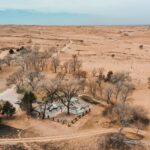Newly elected Gov. Bobby Jindal will face a slew of hurricane recovery problems that plagued his predecessor, but Jindal isn’t charting a complete shake-up of Louisiana’s recovery efforts.
Instead, Jindal, a Republican who takes office in January, wants to streamline bureaucracy, obtain more federal aid and keep many of the measures Democratic Gov. Kathleen Blanco put in place after hurricanes Katrina and Rita devastated south Louisiana two years ago.
He said he plans to retain the Blanco-created rebuilding agency, the Louisiana Recovery Authority. He plans to continue with the hurricane rebuilding and buyout grant program, Road Home, and he said he’ll keep the contractor in charge of the program if it meets performance standards. Jindal also will continue, at least in the short term, to use Louisiana National Guard troops and state police to help fight crime in New Orleans.
The slow pace of recovery after the storms dogged Blanco, who announced last March she would not seek re-election. Red tape continues to bog down recovery efforts, rebuilding money is running dry and New Orleans remains hamstrung by workforce shortages, crime and housing needs.
Jindal told The Associated Press that the recovery folds into larger decisions on how to restructure health care and education systems that were flailing before Katrina and Rita.
To speed up administration of rebuilding dollars already available, Jindal said he wants to shrink the bureaucracy that oversees federal rebuilding aid.
Blanco has defended the layers of state-created review as critical to ensuring the federal money was spent properly. But local officials complained it’s added unnecessary red tape that further slows the already snail-like process.
“There needs to be a greater sense of urgency,” Jindal said.
He said he’s requested meetings with White House officials, including U.S. Homeland Security Secretary Michael Chertoff and President Bush’s hurricane recovery director, Don Powell, to talk about ways to hasten the flow of dollars from the Federal Emergency Management Agency.
“He’s talked in terms of streamlining the process, and I think that’s good to hear … coming from a bureaucrat,” said Wayne Parent, a political science professor at Louisiana State University. Jindal’s background is as a former state health secretary and former chief of one of Louisiana’s university systems.
Jindal also said he liked a recently approved legislative plan to create a revolving fund for the city of New Orleans to help pay upfront costs to repair schools, streets, fire stations and other infrastructure rather than having to wait for FEMA reimbursement.
“It’s really a cash-flow issue,” he said.
The revolving fund requires approval of the state Bond Commission – expected later this week.
To guide recovery efforts, Jindal said he intends to keep the LRA, though he expects a new management style.
Though LRA was created as an advisory agency, Blanco allowed its leaders to make decisions about the mechanics of many recovery efforts. Jindal said he wants LRA’s role to be advisory only.
“I don’t think you can delegate. I don’t think a governor can delegate the important decisions. I think, as governor, it’s my job to help drive the recovery, to help make the tough decisions,” he said. Appointees to LRA’s board will be reviewed, he added.
The governor-elect and current governor agree on the need to get federal help for the Road Home program, which is billions of dollars short of what it needed to pay all eligible homeowners seeking rebuilding or buyout grants.
Blanco has asked Congress for a bailout. Jindal said he and Blanco will work together to lobby Congress for the assistance, which he called a federal obligation.
Road Home started slowly, dogged by complaints the process was cumbersome, the bureaucracy too heavy and the pace of grant awards lethargic. But the pace picked up – only to run into a new problem: a funding shortfall that tops $4 billion and the estimate that without additional cash, the program will run dry by the end of the year.
Jindal said he’ll keep in place ICF International Inc., the contractor hired by the Blanco administration to run Road Home, if it meets the benchmarks for performance and deadlines in its contract. He said he doesn’t want to further disrupt the program.
While New Orleans Mayor Ray Nagin did not endorse Jindal – and Orleans Parish was one of the only parishes he did not carry – Jindal said that won’t hinder his help of the city. “I don’t care who they endorsed. I don’t care who they voted for. The election’s over,” he said.
New Orleans City Council President Arnie Fielkow, who endorsed a Jindal opponent in the governor’s race, said he’s optimistic Jindal will work well with city officials to speak with “one voice” in Washington on relief aid.
As for concerns that the new Republican governor may run into problems with a Democratic Congress, Fielkow said, “The importance of rebuilding what is a great world city does not change, and I think good people with good hearts can make the case.”
Jindal spent Oct. 22 on a bus tour in the New Orleans area, thanking voters for their support in Kenner and Covington. The tour will wraps up Oct. 24.
Meanwhile, he said his staff was setting up transition offices on LSU’s campus where the governor-to-be will make decisions about his cabinet appointments and staff for the new administration.
Was this article valuable?
Here are more articles you may enjoy.

 Johnson Controls Unit to Pay $750M to Settle ‘Forever Chemicals’ Lawsuit
Johnson Controls Unit to Pay $750M to Settle ‘Forever Chemicals’ Lawsuit  Texas Among Several States Facing New Fire Risks: Weather Watch
Texas Among Several States Facing New Fire Risks: Weather Watch  Report: Vehicle Complexity, Labor ‘Reshaping’ Auto Insurance and Collision Repair
Report: Vehicle Complexity, Labor ‘Reshaping’ Auto Insurance and Collision Repair  EVs Head for Junkyard as Mechanic Shortage Inflates Repair Costs
EVs Head for Junkyard as Mechanic Shortage Inflates Repair Costs 